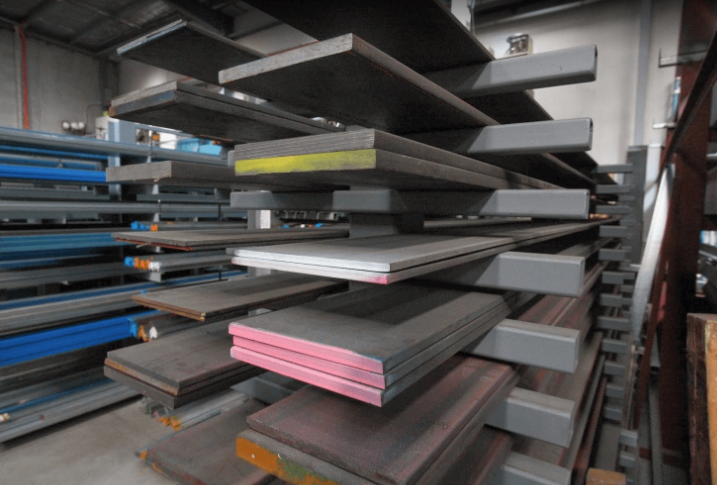Galvanized Steel Sheets: A Professional Selection Guide
1586A comprehensive guide to galvanized steel sheets covering zinc coatings, mechanical properties, international standards, and applications for industrial use.
View detailsSearch the whole station
Steel plates are a fundamental material in construction, heavy equipment manufacturing, trailers, and repair projects. Choosing the right steel plate size is essential for achieving the desired strength, durability, and cost efficiency. This guide covers typical steel plate sizes, thickness options, and tips for selecting the best plate for your application.
In this guide, we’ll break down the most common steel plate sizes used in trailers, machinery, and repair jobs. You’ll learn the advantages of different thicknesses, how to match them to your specific application, and where to find these plates at competitive prices.
Steel plates come in a variety of dimensions to meet different engineering and fabrication needs. The most typical steel plate sizes include:
Common thicknesses include 3/16″, 1/4″, 3/8″, and 1/2″. For lighter weight projects, 1/8″ plates may be used, while 3/16 vs 1/4 steel plate is a common comparison for medium-duty applications.
| Nominal Thickness (inches) | Weight (lb/ft²) |
|---|---|
| 3/16 | 7.65 |
| 1/4 | 10.2 |
| 5/16 | 12.8 |
| 3/8 | 15.3 |
| 7/16 | 17.9 |
| 1/2 | 20.4 |
| 9/16 | 22.9 |
| 5/8 | 25.5 |
| 11/16 | 28.1 |
| 3/4 | 30.6 |
| 13/16 | 33.2 |
| 7/8 | 35.7 |
| 1 | 40.8 |

Trailer builders frequently use structural steel plates with high yield strength. The plate size is chosen based on trailer bed dimensions and load requirements.
These plates are typically welded onto a frame or crossmembers. For general-purpose trailers, 1/4 steel plate offers a solid balance between rigidity and manageability. For lighter weight or budget-sensitive builds, 3/16 sheet metal is often sufficient and easier to handle.
Machinery requires stable bases, mounting platforms, and sometimes custom-shaped structural plates. These must handle static loads, vibration, and, in many cases, long-term outdoor exposure. Construction equipment steel plates are often thicker (1/4″ and above) to withstand heavy loads and impacts. They are used for bucket liners, excavator repairs, and structural reinforcements.
Fabricators appreciate the dimensional consistency of 4’x8′ steel plates, as they fit most plasma tables and cutting layouts. The 1/2 steel plate is preferred when stiffness and minimal deflection are priorities, especially in baseplates or footings. Check out our machinery steel plates designed for durable equipment support.
In the construction industry, steel plates play a critical role in building stability and reinforcement. They are used for base plates, embedded plates, temporary access paths, shoring supports, and more.
Construction engineers and site contractors favor standard sizes like 4×8 steel sheet because they simplify design, procurement, and installation. Visit our structural steel plates for construction page for more options.
Whether you’re patching a rusted trailer floor or reinforcing a damaged structural beam, pre-cut steel plates in common thicknesses can dramatically simplify the job.
In repair scenarios, it’s essential to match or exceed the original steel plate thickness. 3/16 steel plate is especially popular for patching dump beds, reinforcing backhoe arms, or strengthening cracked components.
| Thickness | Typical Application |
|---|---|
| 1/8 inch steel plate | Light repairs, ducting, protective covers |
| 3/16 metal plate | Trailer ramps, floor repairs, small brackets |
| 1/4 inch steel plate | Trailer decks, equipment reinforcement, base plates |
| 3/8 steel plate | Machinery frames, heavy brackets, structural supports |
| 1/2 inch steel plate | Equipment base plates, road plates, foundation plates |
| 3/4 steel plate | Specialized heavy-load applications |
Most steel suppliers stock 4×8 steel sheets as a default size. These dimensions offer:
Frequently used options include:
If you need to cover a defined area without custom cutting, 4’x8′ metal sheets provide fast solutions and predictable pricing.
While 4×8 steel plates are the most common, CJM also supply custom cuts like:
All plates can be supplied in raw, pickled, or shot-blasted finish as needed. We also offer cutting, beveling, and edge preparation on request.
There is no “one-size-fits-all” steel plate for every trailer, machine, repair, or building structure. The best choice depends on your expected loads, fabrication method, and desired longevity.
To summarize:
CJM Steel Group supplies a wide range of structural steel plates, construction equipment steel plates, and custom-sized plates for trailers and repair projects. Whether you need 3/16″, 1/4″, or heavy-duty thick plates, we provide high-quality material with precise cutting and on-time delivery.
Contact us today to request a quote:
WhatsApp: +86 181 9190 6640
Email: info@cjmstainlesssteel.com
A comprehensive guide to galvanized steel sheets covering zinc coatings, mechanical properties, international standards, and applications for industrial use.
View detailsCarbon steel wire is a widely used material in various industries due to its strength, durability, and cost-effectiveness. It is commonly found in applications ranging from automotive to construction, offering an excellent balance of performance a...
View detailsDiscover the best NM400, NM450, and NM500 wear-resistant steel plates for mining and quarry equipment. Improve durability and reduce downtime with CJM Steel.
View detailsCompare tinplate and enamel steel plate for packaging, cookware, and industrial applications. Discover material strengths, limitations, and best-use scenarios.
View details
HelloPlease log in